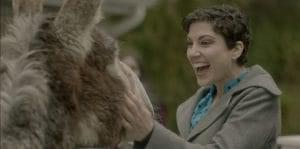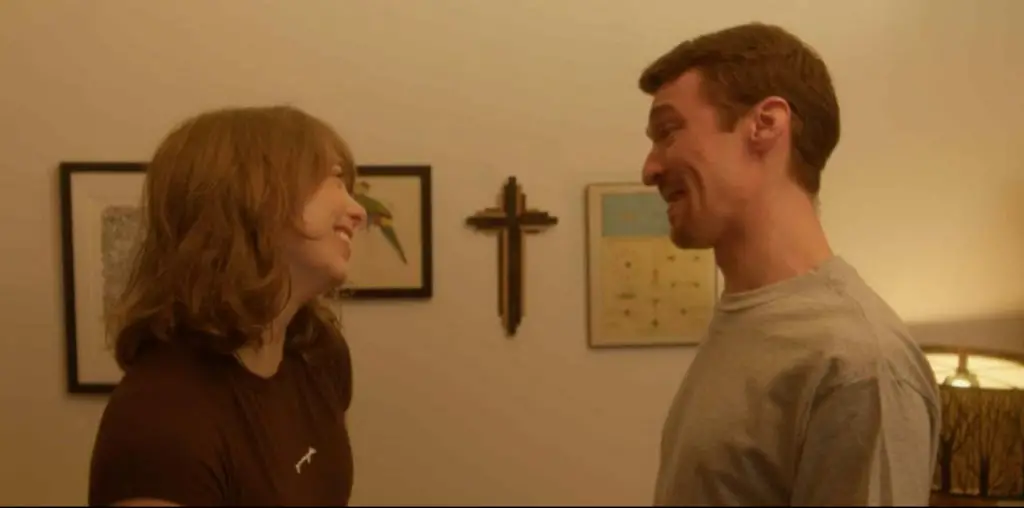
There aren’t many films out there for the hardcore donkey lover. The list is a pretty short one. Off the top of my head only Pinocchio (1940), Bachelor Party (1984), and Au Hasard Balthazar (1966) come to mind. Now, however, there’s a new addition, and this one is aimed at fans of indie dramedies. About a Donkey tells the story of a family going through a rough time. Mom (Katherine Wessling) is clinically depressed, brother Burgh (Ben Kaufman) is keeping his relationship a secret from his family, Cecelia (Christina Shea-Wright) is unemployed, woefully single, and living with sister Annie (Alexandra Clayton), who is expecting a baby. In the midst of this fairly realistic cross-section of American life (adult children living with family, depression, unemployment, prescription drugs, etc.), Dad (Peter Jensen) brings home a donkey. The family is understandably shocked. Dad is almost creepily enamored with the new donkey, T.G., and even though mom is jealous and the kids are concerned, the animal begins to have positive results for everyone.

“Dad is almost creepily enamored with the new donkey and…mom is jealous and the kids are concerned…”
Christina Raia’s film has some major problems. Stilted performances make for rough viewing early in the film. It’s unclear whether Raia’s actors are striving for Whit Stillman stylization or simply arrive there due to large patches of overwritten dialogue. The quality of the sound doesn’t help. A few scenes suffer from hollow audio, and when this is combined with moments of weak performance, the result is a feeling of uncomfortable amateurishness. This rough around the edges production is well suited for a horror film or a gritty, naturalistic drama, but not a quirky indy with heartwarming intentions.
The more About a Donkey moves into its sweet and sincere web of relationships, the more its problematic aspects fall away. Despite some contrived quirk, at the core of the film is a gem of truth: siblings often bond over the dumb things their parents do. This writer speaks from personal experience. Against this relatable reality, the film’s characters begin to endear themselves to the viewer—Cecilia’s romantic foibles and disarming smile, Burgh’s smirking sarcasm, and Annie’s grounded warmth all grow familiar. Ultimately, we begin to like these people. Mom and Dad are weird, and nobody knows it better than the kids. All three siblings have their own issues, but, as is sometimes the case, they’re at their best when it comes to dealing with their parents, and it’s nice to watch.

“Ultimately, we begin to like these people. Mom and Dad are weird, and nobody knows it better than the kids…”
In its own modest way, About a Donkey recreates the sense of “all hands on deck” when there’s a family crisis. In this scenario, some of the film’s smallest details have the biggest impact. When dad is suddenly depressed, Annie has the idea of slipping him a Xanax without him knowing. What’s most striking about this choice is how casually it’s handled. The reality of most American homes is that there’s probably a healthy amount of prescription drugs on hand. It’s just the way it is. At times, Raia’s film trades these small touches of realism for Wes Anderson flights of twee fancy (Grandma thinks she’s psychic and mom is angry at a frog). In these instances, the film flounders.
There’s enough in About a Donkey to endear itself to the viewer. Cecilia’s meet-cute with her grandmother’s nurse (Elisha Mudly) and Burgh telling his mother how beautiful she is are fairly saccharine, but unless you’re more j-j- jaded than Steven Tyler, you’ll probably feeling something. Raia’s film isn’t perfect, but what family is? It’s sort of like an annoying sibling, you know, the kind who taunts you by chanting “I’m not touching you” while hovering a finger an inch from your face. In this case, though, the result is quite the opposite: it ends up touching you.

About a Donkey. Directed by Christina Raia. Written by Kelsey Rauber. Starring Christina Shea-Wright, Ben Kaufman, Alexandra Clayton, Peter Jensen, Ricardo Manigat, Katherine Wessling, Elisha Mudly, Sarah Haruko, and Nabil Vinas.
6 ½ out of 10

